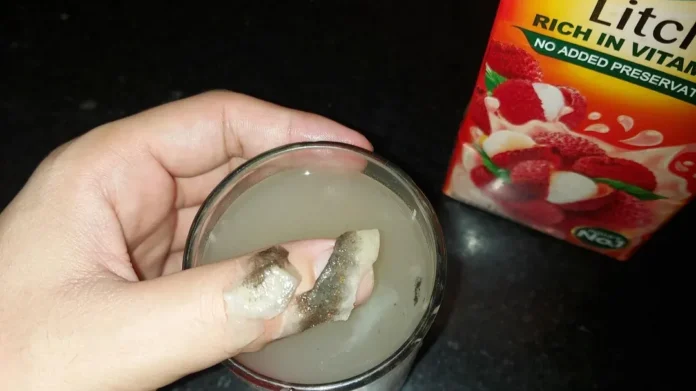In a recent food safety incident, a man from Faridabad claimed to have discovered a fungal contamination inside a sealed tetra pack of Real Fruit Juice he purchased from a local DMart. The consumer, who shared his experience on Reddit, noted that after drinking part of the juice, he noticed the spout had choked. Upon giving the packet a shake and pouring it into a glass, he was confronted with a strange, unidentifiable contamination, which the juice company has since acknowledged, allegedly identifying it as fungus. This incident, however, is far from isolated, as cases of contamination in packaged foods appear to be on the rise across India, raising significant concerns about food safety regulations and enforcement.
Consumer Shocked: Juice Company Apologizes, Classifies Contamination as Fungus
The Reddit post, titled “Found contamination inside a sealed ‘Tetra pack’ of Real Fruit juice!” quickly garnered attention in the Delhi community. The consumer explained he had consumed half the juice over a day or two before noticing an obstruction in the spout. After shaking the packet and pouring it into a glass, he discovered a suspicious substance, later identified by the company as fungal contamination. “Still alive and well. Thank you,” he added humorously, but his experience brings a critical issue into the spotlight: the assumption of safety that sealed and branded products can no longer guarantee.
Dabur, the company behind Real Fruit Juice, responded with an apology and attributed the contamination to fungus, despite the fact that the pack was sealed. Although they offered to investigate the remaining juice, this case highlights the unsettling trend of contamination in supposedly safe, packaged food products and begs the question: how much can consumers trust the safety of what they’re consuming?

A Disturbing Pattern of Contamination in Packaged Food
The Faridabad incident joins a growing list of similar cases that underscore deficiencies in food safety for packaged products in India. In recent months, there have been numerous alarming reports: insects discovered in a popular breakfast cereal, human tissue reportedly found in an ice cream brand, and a dead cockroach allegedly present in a packet of Lays chips. These incidents, some of which went viral on social media, underscore a potentially systemic issue in the country’s food industry.
One particularly shocking case involved a reel showcasing insects inside a box of Chocos, a beloved children’s cereal. Another horrifying discovery involved a consumer claiming to find a human finger in a Yummo ice cream cup, and multiple incidents of consumers finding insects or rodent droppings in their food packets are repeatedly surfacing. These occurrences have alarmed consumers across the country, as such food items often pass through numerous quality checks, allegedly meeting food safety standards before hitting the market.
Regulatory Oversight: What is the FSSAI’s Role in Ensuring Food Safety?
The Food Safety and Standards Authority of India (FSSAI), tasked with setting and enforcing food safety regulations in the country, has yet to implement significant reforms to address these rising concerns. Under FSSAI guidelines, companies are required to adhere to stringent production protocols to ensure products are free from contaminants and safe for consumption. However, the repeated lapses in quality control suggest that either these guidelines are not being followed rigorously by manufacturers or that the FSSAI’s enforcement mechanisms lack the rigor needed to ensure compliance.
Despite multiple complaints, there has been little visible action or public disclosure on efforts to curb contamination in packaged foods. This lack of transparency and accountability has led many consumers to question the efficacy of the FSSAI’s role in protecting consumer health. The organization’s response to these incidents largely remains behind closed doors, with few statements addressing public concerns. Meanwhile, affected companies typically apologize, attributing these lapses to isolated incidents, leaving consumers wary of the potential for similar mishaps in the future.

The Growing Need for Consumer Vigilance and Stricter Food Safety Enforcement
The increase in contamination cases in packaged food underscores a critical need for both stricter food safety enforcement and greater consumer vigilance. For consumers, trusting that a sealed packet guarantees safety has become a risky assumption. Many now believe that the onus has partially shifted to the individual, who must examine food products carefully before consumption. In response, several consumer advocates have called for increased transparency from both food companies and regulatory bodies, demanding that incidents be thoroughly investigated and publicly reported to prevent future occurrences.
For food companies, incidents like the Faridabad juice contamination should serve as a warning. Strict adherence to hygiene and quality control protocols is not just a matter of legal compliance but of consumer trust. Without substantial action from regulatory authorities like the FSSAI, the public’s confidence in the safety of packaged foods will continue to erode, and companies will face increasing scrutiny for lapses in quality.
In light of these recent incidents, the FSSAI and food companies must adopt stricter safety standards, prioritize transparency, and engage with the public to restore confidence in the safety of packaged foods. Until then, consumers are advised to exercise caution when purchasing pre-packaged items, inspect packaging thoroughly, and report any anomalies to the authorities.

